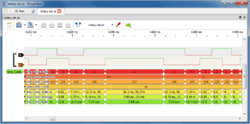Difference between revisions of "Protocol decoder:Graycode"
Jump to navigation
Jump to search
Uwe Hermann (talk | contribs) |
|||
| Line 1: | Line 1: | ||
{{Infobox protocol decoder | {{Infobox protocol decoder | ||
| id = graycode | | id = graycode | ||
| name = Gray | | name = Gray code and rotary encoder | ||
| description = | | description = Accumulate rotary encoder increments, provide timing statistics. | ||
| status = | | status = supported | ||
| license = GPLv2+ | | license = GPLv2+ | ||
| source_code_dir = graycode | | source_code_dir = graycode | ||
Revision as of 16:19, 1 January 2018
 | |
| Name | Gray code and rotary encoder |
|---|---|
| Description | Accumulate rotary encoder increments, provide timing statistics. |
| Status | supported |
| License | GPLv2+ |
| Source code | decoders/graycode |
| Input | logic |
| Output | graycode |
| Probes | — |
| Optional probes | D0-D7 |
| Options | numchannels, edges, avg_period |
The graycode protocol decoder can decode Gray Codes up to 8 data lines (but easily generalizes). One popular special case is the Rotary Encoder, which has two lines, A and B. The decoder will report phase, counting direction, absolute count, as well as timing information.
Parameters
edges: Number of rising and falling edges per turn of all lines. Rotary encoders are usually labeled as having N pulses per turn. A pulse consists of rising and falling edge and you have two lines that are phase-shifted by 90° to one another. This allows to extract 4N edges per turn.
numchannels: due to a current bug in Pulseview, assigned optional probes aren't reported correctly, so you'll have to select the number of channels manually.